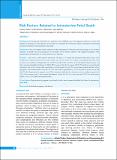Please use this identifier to cite or link to this item:
https://hdl.handle.net/20.500.14356/1432Full metadata record
| DC Field | Value | Language |
|---|---|---|
| dc.contributor.author | Thakur, Achala | - |
| dc.contributor.author | Basnet, Pritha | - |
| dc.contributor.author | Rai, Rubina | - |
| dc.contributor.author | Agrawal, Ajay | - |
| dc.date.accessioned | 2023-05-11T05:32:39Z | - |
| dc.date.available | 2023-05-11T05:32:39Z | - |
| dc.date.issued | 2019 | - |
| dc.identifier.citation | ThakurA., BasnetP., RaiR., & AgrawalA. (2019). Risk Factors Related to Intrauterine Fetal Death. Journal of Nepal Health Research Council, 17(01), 46-50. https://doi.org/10.33314/jnhrc.v17i01.1534 | en_US |
| dc.identifier.issn | Print ISSN: 1727-5482; Online ISSN: 1999-6217 | - |
| dc.identifier.uri | http://103.69.126.140:8080/handle/20.500.14356/1432 | - |
| dc.description | Original Article | en_US |
| dc.description.abstract | Abstract Background: Intrauterine fetal death is a traumatic event. Stillbirth rate is an important indicator to assess the quality of antenatal care. The objective of the study was to identify the risk factors related to intrauterine fetal death in patients admitted with intrauterine fetal death. Methods: It was a descriptive study conducted in the department of Obstetrics and Gynaecology at B. P. Koirala Institute of Health Sciences from January to December 2014. Patients admitted with singleton pregnancy with intrauterine fetal death after 28 weeks gestation were included. Results: There were 11,006 obstetric admissions. Of them, 152 women had intrauterine fetal death. There were 128(84.2%) women between 20-35 years of age. Out of 152, 81(53.3%) women were preterm and 39(2.1%) women were postterm. Primigravida were 77(50.7%) followed by 35(23%) of second gravida. Hypertension was the commonest identified risk factor in 30(26.78%) women. Out of 152 women, 49(32.2%) had not received formal education. Ten (6.6%) women had a past history of fetal death. Four (2.6%) women had medical disorder before pregnancy. One hundred and twenty five (82.2%) women had vaginal delivery, 21(13.8%) had caesarean section and 6(3.9%) had laparotomy for rupture uterus. The commonest indication for caesarean section was placenta previa for 7(33.33%) women. Four (2.6%) women had diabetes. Ninety five (62.5%) were male and 57(37.5%) were female babies. Five (3.3%) babies had malformations. Conclusions: Hypertension in pregnancy was found to be the most common identified risk factor for intrauterine fetal death. Keywords: Fetal death; pregnancy; risk factors. | en_US |
| dc.language.iso | en | en_US |
| dc.publisher | Nepal Health Research Council | en_US |
| dc.relation.ispartofseries | Jan-March, 2019;1534 | - |
| dc.subject | Fetal death | en_US |
| dc.subject | Pregnancy | en_US |
| dc.subject | Risk factors | en_US |
| dc.title | Risk Factors Related to Intrauterine Fetal Death | en_US |
| dc.type | Journal Article | en_US |
| local.journal.category | Original Article | - |
| Appears in Collections: | Vol. 17 No. 1 Issue 42 Jan - Mar 2019 | |
Files in This Item:
| File | Description | Size | Format | |
|---|---|---|---|---|
| 1534-Manuscript-9268-1-10-20190429.pdf | Fulltext Downlaod | 217.26 kB | Adobe PDF |  View/Open |
Items in DSpace are protected by copyright, with all rights reserved, unless otherwise indicated.
